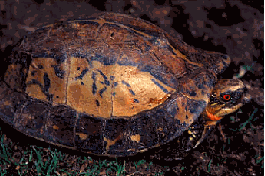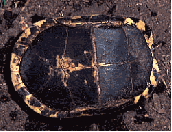|
|
|
|
|
|
Cuora galbinifrons
The attractive 'Flower-back' box turtle lives in northern Vietnam and China, where it is primarily an inhabitant of the forest undergrowth.
This species has a reputation for being 'difficult' in captivity. In reality, provided that the correct environment is available and the specimens are healthy to begin with, it is not as difficult as its reputation suggests. This is a secretive species which does stress easily - it must have a quiet terrarium without undue disturbance. It is imperative that a sphagnum moss substrate is provided, and that this is kept moist at all times. A secondary, slightly drier, area can be provided using leaf and orchid bark. We recommend the use of misting or automatic spraying systems with this species, and suggest that temperatures should range from 70 to 82 °F. Ultrasonic humidifiers have worked well, and both ceramic dull-emitters and under-tank heat pads have also proved successful with these turtles. Whatever heating method is chosen, on no account allow the terrarium to dry out. A soaking and drinking tray with fresh water is also essential. We strongly recommend the use of a full spectrum tube - high UV-B types are not essential with this species, however. The diet should consist of crickets, waxworms, earthworms, zoophobas and pinkie mice. These should be dusted just before use with a quality combined calcium and vitamin D3 supplement. Some fruit and green vegetation is also consumed.
Newly imported specimens are frequently seriously stressed, are dehydrated, and often suffering from gut parasite problems. Entamoeba invadens is a particular problem with this species and is believed to result in high rates of mortality. We strongly advise a routine veterinary examination and immediate treatment if these organisms are identified. Symptoms include diarrhea, wasting, dehydration and lethargy.
|
|
|
|
|
|
|




